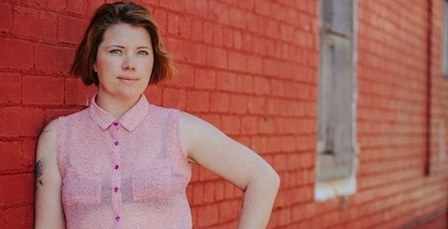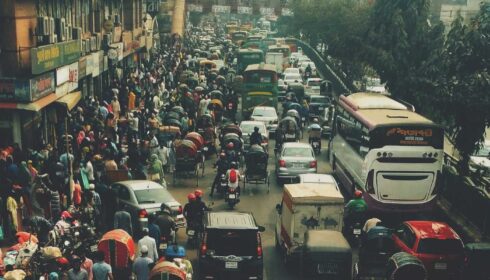
Clementine Ford is a writer, broadcaster, and feminist. Right Now spoke with her about her personal feminism and her thoughts on the major challenges for women’s rights in Australia today.
Right Now: On your blog, Howling Clementine, you wrote: “In 1998, Clementine declared that she believed in women’s rights but not the nasty, manhating ideology of feminism.” Was there a personal catalyst for your decision to become an activist for women’s rights?
Clementine Ford: I wouldn’t say that there was one particular instance, it was more that when I went to university I started a gender studies course, and some friends of mine had been studying it. I suppose it was just that kind of awakening that lots of people go through when they discover feminism or some other kind of political activism. It’s really from that moment that you start to move from ignorance to awareness. I was empowered by that kind of discovery I guess – I mean I was always a feminist, I always had feminist ideals, and even when I was growing up I believed strongly in the rights of women.
I was just afraid of calling myself a feminist because I knew what that meant and it was getting to the point where I was confident enough to say that, or to recognise that the fear of attaching that label to myself had to do with patriarchal values. If I called myself a feminist then I wasn’t the right kind of woman – I was a scary woman, I was a threatening woman, I was unattractive, all those kinds of things. I realised that was all the stuff I wanted to fight against.
Have you encountered discrimination in your work or social life on the basis of your gender?
I think that women encounter that every day, whether or not they can definitively pinpoint it. Particularly as a writer I have definitely encountered it in the feedback I get. I know that I get a level of criticism that is not given to men, or a particular tactic of criticism that is more to do with my gender and less to do with what I’ve actually said. There’s certainly a degree of men who troll the internet looking for women to be critical of.
They hear and see evidence that women are only entitled to a third of the space that men are entitled to.
Another example is the website that I write for now (Daily Life), which is connected to Fairfax Digital. At the moment I don’t think it’s at risk of any kind of funding cuts because it generates women on the internet, and there are readers and writers generating so much content and so much readership. So it has a big base of popularity, but at the same time it has to be relegated to this “women’s site”. It’s the one website where the majority of writers can be women – it has to be identified as a “women’s website”.
You’ve written extensively and personally about women’s rights, including topics such as abortion, victim blaming, body image and the representation of women in the media. What do you think are the major challenges for women’s rights in Australia at the moment?
A lot of people answer that question with something like “We need to get more women on boards, we need to get more women in positions of power”, that kind of stuff. For me, I think those things are important, but I also believe that we can be distracted by putting the fight into that kind of quantifiable measure of success. For me I think that the majority of people don’t think about issues like boards, they don’t think about who is in power. What they’re really being touched with is the representation of women in public space.
People don’t see members of boards – what they do see is women on TV, they hear women on radio. They hear and see evidence that women are only entitled to a third of the space that men are entitled to. And they internalise that and accept that as something normal.
For me it’s about delivering a world in which everyone is treated with respect and with equality.
As soon as you have a situation where a woman is possibly taking 50 per cent of the space, she’s suddenly being aggressive, she’s being domineering, she’s forcing herself into an environment where she’s not wanted. It’s a good case in point where Catherine Deveny recently spoke on Q&A and was criticised horribly for being domineering and bolshie and brash and rude and interrupting everyone and being loud and obnoxious and just being a general kind of harridan.
And when someone went back and looked at the evidence, methodically counted the words that were spoken on Q&A that evening, they found out that Catherine had spoken for less than her equal share, at 17 per cent of the conversation between five people. There were three women on the panel that night and two men, and collectively the women all spoke less than the two men. She spoke less than both of the men. But because she spoke slightly more assertively or aggressively than the other women – or than a woman is supposed to speak – she was crucified for it by the public.
Of course, we’re not stupid – we know that the reality is that we have to take care of ourselves, we’d just like to see at some point the focus shifting to demanding that people not attack women.
And I think this is the most important thing for feminists, more important than the issue of whether we have enough women on boards because people generally don’t care about boards. They don’t care about corporate leadership. They don’t care about who is running companies. What they care about is what they’re seeing.
The fact that we keep having conversations about rape and sexual assault, and putting women in the position where they have to be responsible for protecting themselves from it. Those are the things – the everyday things – that I believe are the biggest kind of challenges that we can overcome right now.
Feminism is a huge umbrella term that encompasses many different groups with contradictory concerns or ideas about women’s rights. What is feminism for you?
I think that feminism is a broad church and there are lots of different ways to view it. There are obviously lots of political strains within it. I’m willing to take up the call that Melinda Tankard-Reist is a feminist – she’s a very different feminist to me.
But at its heart, feminism is about advocating for equality between the sexes, and that also includes the fact (which I think we’re only just realising) that feminism is the liberation of men from patriarchal structures and expectations and a very limited view of masculinity. I think that tackling that is definitely a way of helping to liberate both genders. For me it’s about delivering a world in which everyone is treated with respect and with equality.
People like Miranda Devine for example and others like to say that “Well, you know, in an ideal world, of course women should be able to do whatever they want, but we don’t live in an ideal world – we have to be realistic.” But that again puts all of the onus on women to protect themselves. Of course, we’re not stupid – we know that the reality is that we have to take care of ourselves, we’d just like to see at some point the focus shifting to demanding that people not attack women.
In a recent speech you said that often achieving equality for women is perceived as a loss for men. Why do you think this perception exists, and how can women change it?
I think that is because most decent men obviously are not that selfish. So they understand that equality is going to mean a loss of privilege and power for them because the only reason people hold privilege and power is that they’re holding them over another group of people. It’s the men who are invested in feeling more power and more privilege. If you’re invested in your own power and privilege over another group of people – whether that’s women or class or race – then you will perceive any attempt to equalise that as a loss for you, because you understand that your privilege is a gain. It’s really as simple as that and I think that we need to shift the thinking.
People have tried to paint feminism as a dying cause. It’s in their interests to want it to be killed because it challenges the way that they live their lives.
A lot of people will only tolerate feminism if it doesn’t affect their lives in any way, at all. They will tolerate women’s quest for equality as long as it has no impact on them or their lives. And that is obviously not equality. It’s also willful ignorance and disdain and at its heart, it’s just a really uncompassionate way of living.
Is there anything you’d like to add?
What I would like to add is that the media often likes to present – ever since the early part of the 20th century – people have tried to paint feminism as a dying cause. It’s in their interests to want it to be killed because it challenges the way that they live their lives. So we constantly hear the message that feminism is dead, that young women are not interested in it, that women have moved on, or that we’re in a post-feminist world because equality has obviously been achieved. Now none of that is true.
The thing that really heartens me at the moment is believing not just that feminism is not over and unnecessary, but also seeing evidence of a huge surge of interest in it from young women, despite what the media might say. The problem with the media is that they don’t look in the right place. Some of the old guard and the mainstream media expect any kind of activist movement to be governed the way it always has been, which is on the streets, which is in clear sight – that’s how they understand the world works. But just because they can’t see it – because they’re not looking on tumblr or on the internet or in chatrooms, or Facebook groups – all these places where massive amounts of feminist activity is happening now, and feminist awareness and a burst of a new generation of passionate young women and young men who are interested in this.
Just because they can’t see it, doesn’t mean it doesn’t exist. But I can see it, I know it’s there, and that makes me feel very positive.



